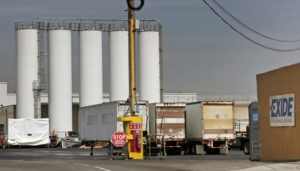LOS ANGELES — A state environmental trust will take over a battery recycling plant in Southern California to prevent its bankrupt owners from abandoning the heavily contaminated facility, a newspaper reported Saturday.
The Department of Toxic Substances Control announced Friday that the trust will assume responsibility for the Exide plant in Vernon, the Los Angeles Daily News reported.
The trust “avoids the many legal challenges posed by abandonment and ensures an orderly transition of ownership and responsibility for maintenance and site cleanup _ all with DTSC’s close supervision and oversight,” the department said in a statement.

Exide is responsible for creating the trust and transferring the property to the new entity, the newspaper said. It will be called the Exide Vernon Environmental Response Trust.
The Exide plant recycled 11 million lead-acid batteries a year until it was forced to shut down in 2015. Before that, Exide had operated on temporary permits for more than 30 years.
High concentrations of lead dust from the plant settled in the soil around thousands of homes in Boyle Heights, east Los Angeles, Maywood, Huntington Park and Commerce, the newspaper said. Lead is a neurotoxin and can cause developmental disabilities, cancer and other long-term ailments.
An $800,000-a-month tent-like shell surrounds the plant’s remaining building to contain the toxic dust still inside. State officials feared abandonment would lead to tears in the fabric and the release of more contaminants into neighborhoods.
The U.S. Department of Justice supported Exide’s bankruptcy plan and its abandonment of the Vernon site.
The DTSC plans to keep pursuing an appeal challenging Exide’s bankruptcy and is not giving up on holding the company accountable, according to the statement.
Exide didn’t immediately comment.
Once the trust is formed, a court-approved trustee will take ownership of the former lead-battery recycling facility and control cleanup efforts. The trust is responsible for all permits, bills and contracts and for selling or leasing the site for redevelopment.
Was this article valuable?
Here are more articles you may enjoy.

 One out of 10 Cars Sold in Europe Is Now Made by a Chinese Brand
One out of 10 Cars Sold in Europe Is Now Made by a Chinese Brand  FM Using AI to Elevate Claims to Deliver More Than Just Cost Savings
FM Using AI to Elevate Claims to Deliver More Than Just Cost Savings  Tesla Sued Over Crash That Trapped, Killed Massachusetts Driver
Tesla Sued Over Crash That Trapped, Killed Massachusetts Driver  Uber Jury Awards $8.5 Million Damages in Sexual Assault Case
Uber Jury Awards $8.5 Million Damages in Sexual Assault Case 